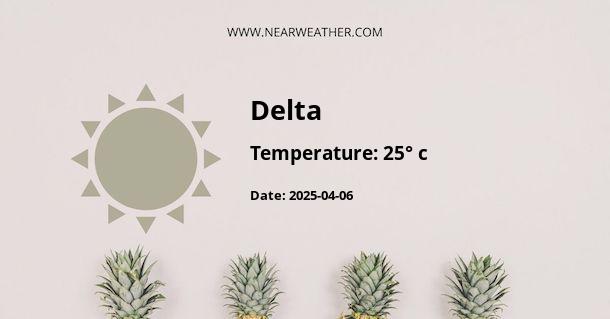Weather
24° 
Climate Conditions: scattered clouds
Humidity: 97%
Wind speed: 3.92 km/h
Wind direction: 211°
Daily Weather Forecast
Monday
12/08/2025
Climate Conditions: broken clouds
Humidity: 95%
Tuesday
12/09/2025
Climate Conditions: light rain
Humidity: 89%
Wednesday
12/10/2025
Climate Conditions: light rain
Humidity: 90%
Thursday
12/11/2025
Climate Conditions: light rain
Humidity: 93%
Friday
12/12/2025
Climate Conditions: light rain
Humidity: 91%
Evolution
Daily Weather Forecast Evolution (°C)
Lowest temperature
Highest temperature
Other Information
Sunrise
06:33
Sunset
18:22
Latitude
5.500000
Longitude
6.000000
Timezone: GMT+05:30
More about Delta:
Climate and Weather in Delta State, Nigeria
Delta State is located in the southern part of Nigeria and experiences a tropical climate with distinct wet and dry seasons. The state has a diverse topography, including coastal areas, mangrove swamps, and riverine plains, which influence its weather patterns throughout the year. Let's take a closer look at the climate and weather in Delta State.Temperature
Delta State generally experiences high temperatures throughout the year, with relatively small variations between seasons. The average annual temperature in the state ranges between 26°C (79°F) and 31°C (88°F). The hottest months are typically February and March, with temperatures occasionally reaching 35°C (95°F) during the day. The coastal areas tend to be slightly cooler due to the influence of the Atlantic Ocean.Rainfall
Delta State has a pronounced wet season, which lasts from April to October, and a dry season, which typically spans from November to March. The state receives a significant amount of rainfall during the wet season, with July and August being the rainiest months. The average annual rainfall in Delta State is around 2,000 to 3,000 millimeters (78 to 118 inches). During the wet season, heavy downpours and thunderstorms are common, which can sometimes lead to localized flooding in low-lying areas. The rain is essential for agriculture in the state, as it supports the growth of crops such as oil palm, rubber, and cassava.Harmattan Season
Delta State experiences the Harmattan season, which typically occurs between November and February. The Harmattan is a dry and dusty trade wind that blows from the Sahara Desert across West Africa. During this season, the humidity levels are lower, and the Harmattan wind brings a haze of fine dust particles, reducing visibility and causing a drop in temperatures.Humidity
Delta State has a high level of humidity throughout the year due to its proximity to the Atlantic Ocean and the presence of its numerous water bodies. Humidity levels typically range between 70% and 90%, with the highest levels during the wet season. The humidity, combined with high temperatures, can make the weather feel hot and sticky.Climate Zones
Delta State can be divided into three main climatic zones: 1. Coastal Zone: The coastal areas of Delta State experience a maritime climate due to their proximity to the Atlantic Ocean. The temperatures are slightly cooler compared to inland areas, and the humidity levels are relatively high. The coastal zone also receives more rainfall compared to other parts of the state. 2. Inland Zone: The inland areas of Delta State have a tropical savanna climate. The temperatures are higher compared to the coastal zone, with less influence from the ocean. The rainfall is slightly lower in these regions, and the vegetation consists of grasslands and scattered trees. 3. Riverine Zone: The riverine areas of Delta State, including the Niger River and its tributaries, have a unique climate influenced by their proximity to water bodies. These areas experience higher humidity levels, cooler temperatures, and more rainfall compared to the coastal and inland zones.Extreme Weather Events
Delta State is occasionally affected by extreme weather events, including tropical storms and hurricanes. These events typically occur during the peak of the wet season, between August and October. The state has experienced significant flooding in the past, mainly in low-lying areas along the coast and riverine regions.Conclusion
Delta State, Nigeria, has a tropical climate with distinct wet and dry seasons. The state experiences high temperatures throughout the year, with the hottest months being February and March. The wet season, from April to October, brings significant rainfall, while the dry Harmattan season occurs between November and February. The state can be divided into coastal, inland, and riverine zones, each with its own climatic characteristics. It is important to consider the weather patterns in Delta State when planning outdoor activities or agricultural practices in the region. Sources: - Delta State Government. (n.d.). Climate. Retrieved from https://deltastate.gov.ng/climate - Nigerian Meteorological Agency. (n.d.). Climate of Nigeria. Retrieved from https://www.nimet.gov.ng/climate-of-nigeriaFAQ's about Delta's Weather:
Q - What is the Latitude and Longitude of Delta?
A - Delta's Latitude is 5.500000 & Longitude is 6.000000.
Q - What is the weather in Delta today?
A - Weather in Delta is 24° today.
Q - What is the climatic condition of Delta today?
A - Climate Conditions in Delta shows scattered clouds today.
Q - What is the humidity in Delta today?
A - Humidity in Delta is 97% today.
Q - What is the wind speed in Delta today?
A - Wind speed in Delta is 3.92 km/h, flowing at 211° wind direction. today.

Nearby Locations
Latest searched locations